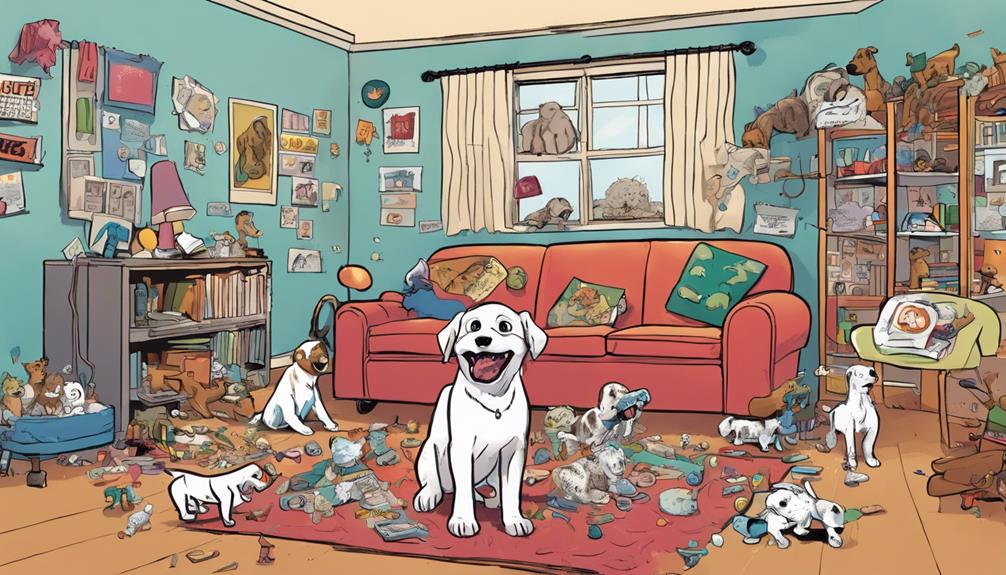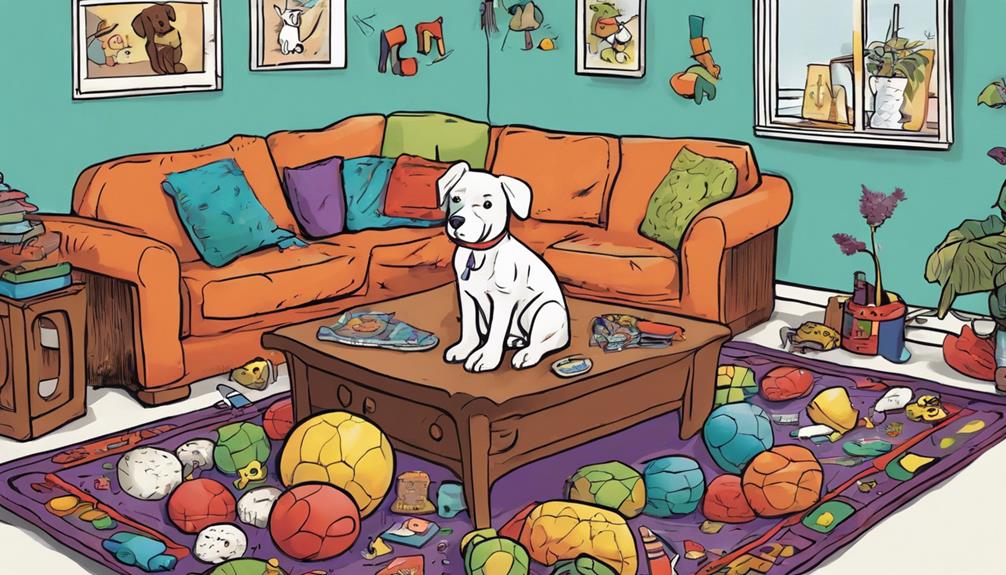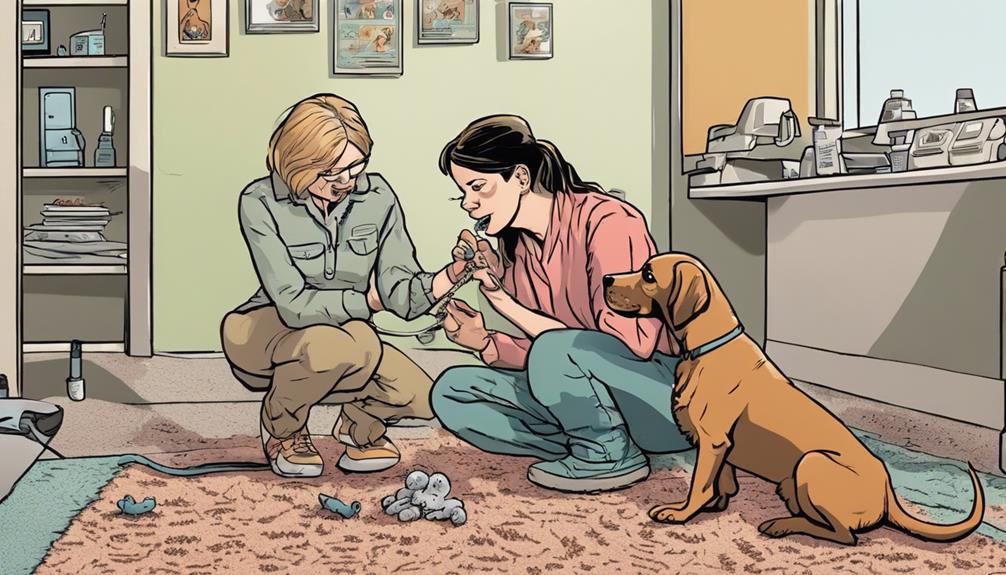Most dogs start losing their baby teeth around 3.5 months old, and this process continues until they're about 6 months old. You'll typically see the incisors come out first, followed by canines and premolars. By 4 to 5 months, most puppies lose all their deciduous teeth. Keep an eye on any symptoms, like increased chewing or drooling, which can indicate teething pain. If your pup still has baby teeth past 6 months, consider checking in with a vet. Understanding this timeline will help guarantee your dog's dental health during this important stage. There's plenty more to explore about puppy dental care. As puppy owners, it’s important to be aware of which teeth do puppies lose during this stage of development. The deciduous teeth are the ones that will be shed, making room for the permanent set to come in. These include the incisors, canines, and premolars, which are gradually replaced with the adult teeth. It’s important to monitor this process and provide proper dental care to ensure the health and wellbeing of your growing pup.
Key Takeaways
- Puppies begin losing baby teeth around 3.5 months old and continue until approximately 6 months old.
- Incisors are usually the first to fall out, followed by canines and premolars.
- By 4 to 5 months, most puppies will have lost all of their deciduous teeth.
- Delayed tooth loss beyond 8 months may indicate dental issues that require veterinary attention.
Puppy Teething Timeline

Puppies typically start losing their baby teeth around 3.5 months old, and this process continues until they're about 6 months old. During this puppy teething phase, you'll notice that your pup's baby teeth begin to fall out, starting with the incisors. As the months progress, the canines and then the premolars follow suit. By around 4 to 5 months, most puppies will have lost all their deciduous teeth, making way for their permanent teeth.
This shifting period can be challenging for your puppy, as teething pain may lead to increased chewing behavior. It's natural for pups to seek relief by gnawing on various objects, so providing appropriate chew toys can help.
Keep an eye out for any common dental problems, especially in smaller breeds, where retained baby teeth might occur. If you notice any baby teeth sticking around past the 6-month mark, it's essential to consult your vet.
Addressing these issues early can prevent further complications and guarantee your pup's dental health remains on track as they move to their adult teeth.
Symptoms of Teething

During the teething phase, you might notice your puppy exhibiting several symptoms that signal discomfort, such as increased chewing behavior and excessive drooling. This phase typically starts around 3.5 to 4 months and can last until your puppy is about 6 months old. As the baby teeth begin to loosen, you may see signs like whining or pawing at the mouth as your puppy tries to cope with the discomfort.
You might also notice small blood spots on toys or surfaces, indicating that baby teeth are falling out. Along with these signs, teething can lead to bad breath and changes in eating habits, as the discomfort might make your puppy less willing to chew food.
Keep an eye out for these symptoms, as they're normal during the teething process. However, if you find that your puppy's discomfort persists or the teeth don't seem to be falling out naturally, it's crucial to consult with a veterinarian.
Understanding these signs will help you provide the necessary support for your puppy during this challenging time.
Monitoring the Teething Process
Monitoring your puppy's teething process is essential to guarantee a healthy change to permanent teeth. As your puppy begins losing its deciduous teeth around 12 weeks, being attentive can help prevent potential dental issues later on. You'll want to keep an eye on various signs and behaviors during this transformation.
Here are some key aspects to watch for:
- Timing of Tooth Loss: Keep track of when puppy teeth fall out, especially if the process seems delayed past eight months.
- Observation of Symptoms: Look for increased chewing, drooling, or discomfort, as these can indicate the teething process is in full swing.
- Mouth Checks: Regularly check your puppy's mouth for lost teeth and any retained deciduous teeth.
Safe Chew Toys

As your puppy navigates the teething process, providing safe chew toys can help soothe sore gums and keep them engaged. It's vital to choose teething toys made of soft rubber or flexible materials to protect their developing teeth and gums.
Avoid hard chew items like bones or nylon toys, as these can break your puppy's teeth and lead to serious dental issues.
To maintain your puppy's interest, rotate their chew toys regularly. This way, they'll always have something new to engage with. Frozen teething toys are particularly effective during the teething phase, as the cold can provide additional relief for sore gums.
While your puppy enjoys their chew toys, it's important to supervise your puppy closely. This helps prevent choking hazards or gastrointestinal blockages from swallowed toy pieces.
Always check the toys for wear and tear, replacing them as needed to guarantee your puppy's safety. By providing the right safe chew toys, you'll help your puppy through this challenging time while also protecting their dental health and keeping them entertained.
Addressing Chewing Behavior

As your puppy goes through teething, it's important to understand their natural chewing instincts.
You'll want to redirect any inappropriate chewing by providing safe and engaging chew toy options.
Understanding Natural Chewing Instincts
Understanding your puppy's natural chewing instincts is important for addressing their behavior during the teething phase. As your puppy navigates the teething process, they'll likely experience discomfort from their baby teeth falling out and permanent teeth emerging. This can intensify their chewing behavior, making it essential for you to provide appropriate outlets for that urge.
Here are some key points to reflect on:
- Chewing alleviates teething pain: It offers relief and helps soothe sore gums.
- Chew toys are important: Providing durable chew toys redirects your puppy's chewing from furniture and belongings.
- Supervision is necessary: Keep an eye on your puppy to prevent them from chewing on dangerous items that might cause choking or blockages.
Redirecting Inappropriate Chewing
Redirecting your puppy's inappropriate chewing is essential for protecting your belongings and ensuring their safety during the teething phase. When puppies are around, they often have a strong urge to chew on everything, which can lead to destructive behavior if not addressed.
To curb this, providing suitable alternatives like teething sticks is a good idea. These toys can satisfy their need to chew and help with discomfort from emerging teeth.
Supervision is essential during this time. Keep a close eye on your puppy to prevent them from chewing on harmful items or valuable possessions. If you catch them in the act, calmly redirect their attention to an appropriate chew toy. This is key in redirecting inappropriate chewing and reinforcing positive behavior.
Additionally, regular exercise can help channel your puppy's energy and reduce the likelihood of destructive chewing. Engage in playtime or training sessions to keep them mentally and physically stimulated.
Safe Chew Toy Options
Choosing safe chew toys for your teething puppy is vital to protect their developing teeth and provide comfort during this challenging phase. Teething puppies often experience discomfort, so selecting the right toys is essential. Look for options made of soft rubber or flexible materials that won't damage their delicate teeth.
Here are some effective chew toy options:
- Soft rubber toys: These are gentle on your puppy's mouth while still satisfying their urge to chew.
- Frozen toys: Chilling or freezing toys can soothe sore gums and provide relief from teething pain.
- Flexible chew toys: These options are less likely to break and are safer than hard objects like bones or nylon toys.
Always supervise your puppy while they chew to make sure they don't accidentally ingest any parts or face choking hazards.
When to Consult a Vet

If your puppy hasn't started losing baby teeth by 4-5 months, it might be time to consult a vet about delayed tooth loss.
Keep an eye out for signs of discomfort, excessive drooling, or persistent baby teeth after adult ones have come in—these could indicate potential issues.
Regular vet check-ups can help catch any dental problems early, ensuring your pup's mouth stays healthy.
Signs of Concern
Recognizing the signs of concern during your puppy's teething process is essential for ensuring their dental health and overall well-being.
While teething is a natural phase, certain signs indicate that it's time to consult the vet. Here are some key indicators to watch for:
- If your puppy hasn't started losing their deciduous teeth by 4-5 months, it could suggest a delay that needs evaluation.
- Look out for persistent baby teeth alongside new adult teeth, which can lead to dental complications if left unchecked.
- Excessive discomfort is concerning. If your puppy whines excessively or paws at their mouth, it's a good idea to seek veterinary guidance.
Delayed Tooth Loss
It's vital to keep an eye on your puppy's tooth loss, as delayed shedding of baby teeth can lead to serious dental issues. If your puppy hasn't started losing teeth by 4 months, you should monitor the situation closely.
Delayed tooth loss can indicate that baby teeth are retained, which is especially common in small and brachycephalic breeds. When retained deciduous teeth remain, they can cause malocclusion and discomfort, which may require veterinary intervention.
By 8 months, all permanent teeth should ideally be present. If baby teeth still linger, a vet should be consulted to prevent potential complications down the road.
Watch for signs of trouble, such as persistent bad breath, difficulty chewing, or any visible signs of discomfort.
Regularly observing your puppy's mouth during the teething process is fundamental. If you notice any concerns about delayed tooth loss or retained teeth, don't hesitate to reach out to your veterinarian.
Early intervention can save your pup from unnecessary pain and guarantee a healthy dental future.
Caring for Adult Teeth

Caring for your dog's adult teeth is vital to prevent dental issues and guarantee their overall health. As a dog owner, you'll want to establish a routine that prioritizes dental hygiene to keep plaque at bay and maintain the integrity of your canine's teeth.
Here are some key practices to take into account:
- Brush Regularly: Brush your dog's teeth several times a week using a toothbrush and toothpaste specifically designed for dogs.
- Provide Chew Toys: Offer appropriate chew toys that help reduce plaque and tartar buildup while keeping your dog entertained.
- Monitor Oral Health: Keep an eye out for any signs of dental problems, such as bad breath or swollen gums, and address them promptly.
Professional Dental Cleanings

Regular brushing and chew toys help maintain your dog's dental health, but professional dental cleanings are also important for preventing serious issues like periodontal disease.
It's generally recommended to schedule these cleanings at least once a year for adult dogs. This routine guarantees optimal oral health by addressing plaque buildup before it can lead to more considerable problems.
During a professional dental cleaning, your veterinarian will remove tartar and plaque, assess gum health, and perform any necessary dental procedures, such as extractions. This thorough approach is essential for maintaining your dog's dental hygiene, especially since some dogs, depending on their breed, age, and individual dental health, may require more frequent visits.
To make the process smoother, handling your dog's mouth during grooming and play can help them acclimate to dental cleanings.
By prioritizing professional cleanings alongside regular brushing, you'll contribute greatly to your furry friend's overall health and well-being.
Don't overlook the importance of these veterinary visits; they're crucial for preventing periodontal disease and guaranteeing your dog maintains a healthy, happy smile.
Frequently Asked Questions
Do Dogs Still Have Baby Teeth at 7 Months?
At 7 months, most dogs won't have baby teeth left. However, some may still retain a few, especially smaller breeds. If you notice any, it's best to consult a vet for advice.
What Age Do Puppy Teeth Fall Out?
Puppy teeth typically start falling out around 3.5 months old. You might notice the incisors go first, followed by canines, and by 6 months, your pup should have a full set of adult teeth.
What Are the Worst Weeks for Puppy Teething?
During those stormy weeks between 12 to 16 weeks, your puppy's teething journey feels like a wild rollercoaster. They'll drool, whine, and chew everything in sight, seeking relief from that discomfort of emerging adult teeth.
Are Dogs Still Teething at 12 Months?
No, by 12 months, your dog shouldn't be teething anymore. They should have all their permanent teeth in place, and any signs of discomfort typically disappear, allowing you to focus on their dental care.
At What Age Should I Expect My Dog to Lose Their Baby Teeth?
Most dogs will start to lose their baby teeth and gain their adult teeth between the ages of 4-6 months. You may notice some bleeding or discomfort during this time, but it’s a natural process. Keeping chew toys around can help ease the pain when do baby teeth fall.
Conclusion
To conclude, understanding when your puppy loses their baby teeth, recognizing teething symptoms, and providing safe chew toys are all essential steps in ensuring a smooth teething process.
By monitoring their behavior, addressing any chewing issues, and knowing when to consult a vet, you'll set your pup up for a healthy dental future.
Remember, caring for adult teeth and scheduling professional cleanings will keep their smile bright and their breath fresh.
Embrace these steps for a happier, healthier dog!









